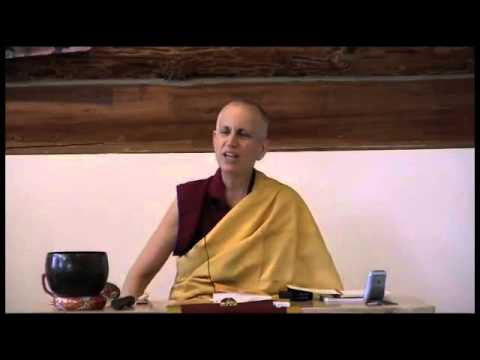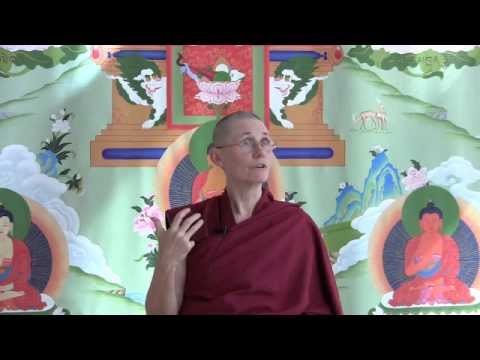Dedication and rejoicing
Part of a series of teachings given at the Winter Retreat from December 2011 to March 2012 at Sravasti Abbey.
- Taking time to rejoice
- What is meant by my “merit”
- Making the dedication powerful
- What it means to rejoice
- The purpose of dedicating merit
Vajrasattva 31: Rejoice and dedicate (download)
So, now we’re at the point of dedication in the sadhana. We’re going to spend the next two sessions on that, but first there’s something that comes before that. So in the text it says:
With delight Vajrasattva melts into light, dissolves into you, concentrate on this.
Then there’s a space, a paragraph space, then there’s a line that says: Dedication
Then there’s another space. And then we start the dedication prayer. So this space is really significant. This is the space for rejoicing. It doesn’t say this in the text but it’s really, really, really important that we take this minute right here, and I would say that none of us does this enough and I would guess that most of us forget to do it most of the time. Is that true for you? When you get to that point, is rejoicing what comes to your mind? It doesn’t for me. I’m guessing what’s going on in your mind based on what’s going on in mine. And yet, it is an extremely, extremely important point of the practice.
So, what does it mean to dedicate? And, what are we dedicating? That’s what relates to this rejoicing business. So the dictionary says to dedicate means, “to devote time, effort or oneself to a particular task or purpose.” Time, effort or oneself to a particular task or purpose. So in this case, would you say what we’re devoting to this particular purpose is our time, our effort, or our self? All three. Yes. So, we think about where we are in the sadhana. We’ve just done one hour and twelve minutes of setting a motivation, reflecting on the kindness of sentient beings, the difficulties of samsara, and setting a clear determination that we want to do this practice and we’re going to free all of them and ourselves from the suffering of samsara. So we’ve done that. We’ve turned to the Buddha, Dharma, Sangha for refuge. Setting clear direction, we’ve generated that bodhicitta thought again. We’ve reflected then on what are some of the big obstacles for us being able to do that; our negative karma, our negative actions. So we’ve examined some of those and we’ve really looked at the cause, we’ve looked at the affliction in our mind, we’ve generated regret, a really sincere feeling for that.
Then we turned our minds to Vajrasattva. We’ve spent a long time saying this very powerful mantra to ourselves. We’ve spent a long time mixing our mind with the completely purified qualities of this Buddha. And then we spent some time saying, “Okay, I’m not ever going to do this again. Or at least I’m not going to do this much, soon.” We’ve spent some time really restraining ourselves. So we’ve spent an hour and twelve minutes reversing something that we have been doing since beginningless time. This is something to rejoice about. This is something to really notice, no matter what our opinion about our practice is. Whether we think, “wah wah wah … I’m so distracted, blah blah blah. I’m not really focused. I don’t really get this.” Whatever other stuff is there, this is a huge commitment of time, effort, and self towards something that’s really a powerful transformation. So to whatever extent that we think we’ve done that, would you say we’ve created some merit? Yes! We have created some merit. Say “yes!” Yes, we have.
Okay, so what is merit? Merit is, “imprints of positive actions which will result in happiness in the future,” sometimes translated as positive potential or good karma. Okay, we’ve created good karma. Now we’re in the practice of dedicating our good karma. We’re dedicating our merit. So then we get back to the text. What are we dedicating for?
Due to this merit may we soon attain the enlightened state of Vajrasattva.
Well, that goes back to our initial motivation, right? It reflects exactly where we started from. We said, “I’m going to make this practice head in the direction of becoming a completely awakened Buddha so that I can liberate all living beings from their suffering and bring them into happiness.” Right, so now we’re saying it again, to once again steer our mind or direct all these thoughts that we’ve just had towards ripening in that way, towards our complete enlightenment. So, we need to make our dedication really powerful. We need to get conscious that we actually did create some merit and really acknowledge that. And when we have that conviction, then it also calls up our conviction in what we’re doing. Can I really be a Buddha? Does this really work? Does cause and effect go that far? All those kinds of questions or doubts that we have (it’s fine to have them as we’re still exploring this) but the more we practice and the more we really practice dedication itself, the more we learn to rejoice in our merit and then really get intentional about where we’re steering it, the more we are called upon to really develop some understanding and then some conviction about what we’re doing, how we’re heading our mind to go. So what we’re saying with this dedication is, “I want my positive energy, my positive imprints, and the results of this practice, to ripen in my full awakening.” That’s what we’re saying. And so rejoicing is like the foundation of our whole dedication.
Next question. What is rejoicing? Rejoicing is taking delight in virtue. Very simple, taking delight in virtue. So we take a moment to acknowledge, “Yes, I created virtue and I’m delighted with this. I take total delight.” So Pabongka Rinpoche says, “rejoicing is a bodhisattva’s practice, so it’s difficult for us to do, even a little, in our thoughts.” So that’s a little bit reassuring. It’s like, “Oh, bodhisattvas do this all the time.” We’re not bodhisattvas yet so it’s difficult to do in our minds, but he says, “If we do this well, there is no better way to build up our accumulations of merit and wisdom.” Which are necessary for us to achieve this Buddhahood that we are. It means, that’s the very foundation that becomes the Buddha, our accumulations of merit and wisdom.
So the purpose of the dedication then, as we’ve said, is to steer the merit that we’ve created to ripen in a certain way. And as His Holiness says, “The primary purpose of dedicating the merit is so that the virtue will bring inexhaustible results, lasting until all sentient beings attain enlightenment.” That is a potent thing. “The purpose of dedicating merit is so the virtue will bring inexhaustible results, lasting until all sentient beings attain enlightenment.” So we’ll talk more about that, and what to really dedicate for, next time. But in the mean time, really practice rejoicing. It’s a small testimonial; it really changes your mind quickly. I have a mental habit that goes to discouragement very easily and rejoicing is the best antidote that I can think of to our self deprecating thoughts about the quality of our own practice. So, practice it for a few days and we’ll talk some more.
Venerable Thubten Chonyi
Ven. Thubten Chonyi is a nun in the Tibetan Buddhist tradition. She has studied with Sravasti Abbey founder and abbess Ven. Thubten Chodron since 1996. She lives and trains at the Abbey, where she received novice ordination in 2008. She took full ordination at Fo Guang Shan in Taiwan in 2011. Ven. Chonyi regularly teaches Buddhism and meditation at the Unitarian Universalist Church of Spokane and, occasionally, in other locations as well.


